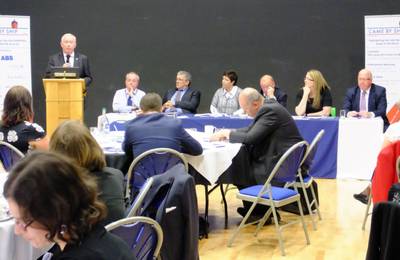Perils of Heavy Ship Containers Debated
Maritime experts are torn on how to curb the menace of overweight shipping containers, which cause severe accidents at sea and on the roads. The difficulties of resolving false declarations of the weight and content of boxes were underlined during a panel discussion at the WISTA-UK Liverpool Forum.
WISTA-UK is encouraging debate on the critical question of container weight. The forum audience was informed that insurers estimate that 20% of containers crossing seas and highways are overweight, designating each box symbolic of “an accident waiting to happen.” The cost is heavy in financial, human and environmental terms.
Speakers gave various examples describing overweight containers that caused ships to lose stability and catch fire, as well as fatal accidents on the road. Ship owning and operating interests are worried. Though interests which trade the goods say that weighing all containers ahead of shipment is unnecessary and impractical, fearing that enforcement of container weigh-ins could add up to $5 billion a year to the cost of international commerce.
The panel of experts addressing the WISTA-UK session gave their views in light of draft amendments to Chapter VI of the Safety of Life at Sea convention. The changes, proposed by the maritime safety committee of the International Maritime Organization, would require mandatory verification of the gross mass of containers. Shippers would have to weigh either the entire container, or the individual packages and dunnage (the loose material that holds cargo in position).
Debate moderator, Winnie Sorensen of Wenford Ltd, highlighted the importance of accurate information by stressing that ccontainership cargo accounts for nearly 60% of the value of goods traded by sea. The global container inventory amounted to some 34.5m(teu), and carried by more than 6,000 containerships.
Speaker Ken McLean, maritime arbitrator, listed the stark consequences of inaccurate container data: lost containers, hazards to navigation, risks to crew, loss of and damage to ships, and adverse publicity for the industry.
McLean said that in many cases containers arrived for loading “half an hour before the ship is due to sail,” and described sea conditions in which containers regularly could go over to a 30 degree angle.
McLean quoted shipping commentator Michael Grey, who had said that when he was at sea “our paperwork is better than our ships.”
Zara Giles, Sales & Logistics Development Manager for Peel Ports at Liverpool, said that from a port management perspective, “we would love all containers to be weighed the day they get to the port.”
Bill Brassington of ETS Consulting, adviser on safety and security in the freight supply chain, cited serious road accidents involving ‘eccentric’ container loads. “Would weighing have made any difference? I suggest it would,” he said.
When Brassington analyzed the weight and stability of 125,000 containers ahead of the drafting of the IMO code, it appeared that 5% of them were ‘dangerously eccentric’, with weights of up to 80 tons. “There is likelihood that a large number of containers are technically illegal.”
Weighing, as opposed to calculating, was the only way of obtaining the gross mass of a container. “Any calculation method has a degree of error. Whatever they weigh may become dry or wet, but with the right equipment weighing can be done and identify the exact centre of gravity.”
He claimed that about 1% to 1.5% of all containers were seriously overweight, and warned: “People do abuse the system even if they weigh.”
John Dickinson, head of the Nautical Institute delegation to the IMO, recalled that after the grounding in 2007 off Cornwall of the MSC Napoli, 20% of containers were found to be over 3 tons different from their declared weight. Dickinson feared the draft amendment to Solas would still leave the system open to misuse and fraudulent paperwork.
Chris Evans, cargo supply chain commercial manager at DP World London Gateway, said that his company had a strong belief in safety and “it will not be compromised.” He said: “That means everybody in this industry has to make a proper declaration. But people don’t play the game. People are not clear about what they put into containers. This covers the globe. It is important that everybody weighs, and to weigh with accuracy there is a need to have it documented, which is a separate industry question.”
Evans went on, “You should not walk away thinking that [dealing with ‘rogue’ containers] is easy. Some companies are much less sophisticated than those in the UK and Western Europe.”
He invited the audience to imagine the task of weighing hundreds of export containers within a short time frame, with delivery 2-3 days before a vessel sails. “In the end, trust is the foundation of trade; otherwise you would not have globalization as it is now. You cannot expect to weigh every single container in the same place, otherwise you get a bottleneck,” he said.
He asserted: “By and large it is the cargo companies who misdeclare.” Pressure to accept containers came from big customers.
Alan Robertson, of Webster Robertson, a container project consultancy, called for a greater focus on the start of the operation and the role of shippers.
Robertson said that the US Congress for some years had tried to install a program to X-ray every single container. “It has been put back and the latest indication is that it is just not going to happen, and with the [potential] logjam in the ports it is not practical.”

















